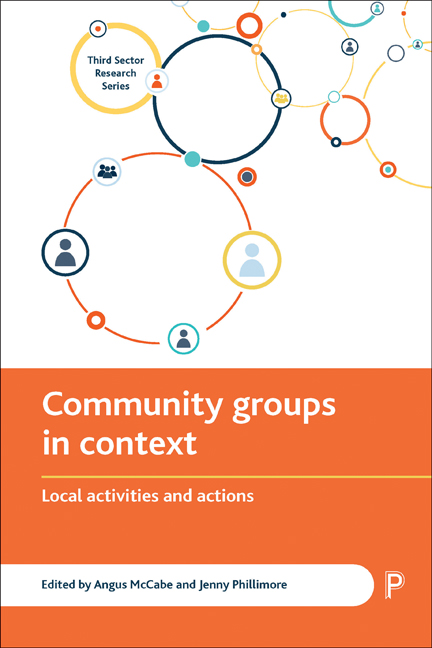Book contents
- Frontmatter
- Contents
- List of tables and figures
- Foreword
- Series editor’s foreword
- Acknowledgements
- Notes on contributors
- Introduction Why get below the radar? The importance of understanding community groups and activities
- Part One Scoping and mapping community actions and activities
- Part Two Community groups and activities in context
- Part Three Under-explored radars
- Part Four Thinking about voice, learning and emotion below the radar
- Index
seven - The UK Gypsy, Traveller and Roma third sector: a Gypsy industry or route to empowerment?
Published online by Cambridge University Press: 05 April 2022
- Frontmatter
- Contents
- List of tables and figures
- Foreword
- Series editor’s foreword
- Acknowledgements
- Notes on contributors
- Introduction Why get below the radar? The importance of understanding community groups and activities
- Part One Scoping and mapping community actions and activities
- Part Two Community groups and activities in context
- Part Three Under-explored radars
- Part Four Thinking about voice, learning and emotion below the radar
- Index
Summary
Chapter aims
This chapter aims to:
• explore the historical and contemporary condition of the Gypsy, Traveller and Roma civil society movement;
• analyse its varied, evolving and often overlapping forms, including oppositional campaigns, service-oriented organisations and, more recently, bridging or advocacy organisations;
• suggest how wider alliances within social justice movements are potentially shifting the forms and focus of struggle for Gypsies, Travellers and Roma.
Introduction
This chapter reviews the strengths, achievements, threats and pitfalls facing Gypsy, Traveller and Roma (GTR) civil society, and the role GTR voluntary and community organisations have played in defending and enhancing the political and cultural rights of these marginalised groups. Drawing on historical and contemporary analysis, we explore the motivation, dynamism and tensions inherent in varied manifestations of GTR community activism and the struggles against, and impact of, assimilatory and discriminatory policy. Finally, we explore the way community bonds and diverse aspects of identity interplay in the growth of community activism and the survival and development of the sector, often against the odds.
The roots of the Gypsy, Traveller and Roma third sector
In 1966, the Gypsy Council was formed in the UK as a campaigning organisation. Among the leading catalysts was the non-Gypsy campaigner Grattan Puxon, who, prior to this, had honed his skills in community mobilisation in Ireland by working with Irish Travellers in a campaign centred on resistance to eviction. In both the UK and Ireland, a growing body of restrictions on nomadism and the breakdown in the symbiotic economic relationship between farmers and nomadic communities greatly diminished the supply of stopping places and scope for Traveller lifestyles. Hence eviction became a pronounced feature of Gypsy/Traveller life (Acton, 1974). As in Ireland, Puxon (through the Gypsy Council) helped thread a network of charismatic community leaders and extended families into a coherent campaign. The Gypsy Council presented a landmark moment, being the first formal national GTR non-governmental organisation (NGO) in the UK and indeed one of the first in Europe. The Gypsy Council was later weakened by disputes and fissures. Many of these centred on what role non-community members should play, debates about the value and danger of being linked too closely with services and centres of power and the tensions caused by charismatic leadership (Acton et al, 2014).
- Type
- Chapter
- Information
- Community Groups in ContextLocal Activities and Actions, pp. 135 - 154Publisher: Bristol University PressPrint publication year: 2017

